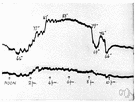variance
Also found in: Thesaurus, Medical, Legal, Financial, Idioms, Encyclopedia, Wikipedia.
Related to variance: standard deviation, variance analysis
var·i·ance
(vâr′ē-əns, văr′-)n.
1. The state or quality of being variant or variable; variation: considerable variance in temperature across the region.
2.
a. Difference or inconsistency: Your behavior is at variance with your beliefs.
b. The state or fact of being in disagreement or in conflict: I am at variance with her over who should pay for the damage.
3. Law
a. A discrepancy between two statements or documents, especially between the charge in a criminal indictment and the evidence presented.
b. An exception to the application of a usual rule, granted by an authority on the basis of hardship or practicality: a zoning variance.
4. Statistics The square of the standard deviation.
5. Chemistry The number of thermodynamic variables, such as temperature and pressure, required to specify a state of equilibrium of a system, given by the phase rule; the degrees of freedom of a system.
American Heritage® Dictionary of the English Language, Fifth Edition. Copyright © 2016 by Houghton Mifflin Harcourt Publishing Company. Published by Houghton Mifflin Harcourt Publishing Company. All rights reserved.
variance
(ˈvɛərɪəns)n
1. the act of varying or the quality, state, or degree of being divergent; discrepancy
2. an instance of diverging; dissension: our variance on this matter should not affect our friendship.
3. at variance
a. (often foll by with) (of facts, etc) not in accord; conflicting
b. (of persons) in a state of dissension
4. (Statistics) statistics a measure of dispersion obtained by taking the mean of the squared deviations of the observed values from their mean in a frequency distribution
5. (Law) a difference or discrepancy between two steps in a legal proceeding, esp between a statement in a pleading and the evidence given to support it
6. (Government, Politics & Diplomacy) (in the US and Canada) a licence or authority issued by the board of variance to contravene the usual rule, esp to build contrary to the provision of a zoning code
7. (Chemistry) chem the number of degrees of freedom of a system, used in the phase rule
8. (Accounting & Book-keeping) accounting the difference between actual and standard costs of production
Collins English Dictionary – Complete and Unabridged, 12th Edition 2014 © HarperCollins Publishers 1991, 1994, 1998, 2000, 2003, 2006, 2007, 2009, 2011, 2014
var•i•ance
(ˈvɛər i əns)n.
1. the state of being variable or different.
2. an instance of varying.
3. Statistics. the square of the standard deviation.
4. the number of degrees of freedom of a physical system.
5. Law.
a. a discrepancy, as between two sworn statements.
b. a departure from the cause of action originally stated in a legal complaint.
6. a permit to do something normally regulated by law.
7. a disagreement or dispute.
Idioms: at variance, in a state of disagreement.
[1300–50; Middle English < Latin]
Random House Kernerman Webster's College Dictionary, © 2010 K Dictionaries Ltd. Copyright 2005, 1997, 1991 by Random House, Inc. All rights reserved.
ThesaurusAntonymsRelated WordsSynonymsLegend:
Switch to new thesaurus
| Noun | 1. | variance - an event that departs from expectations deviation, difference, divergence, departure - a variation that deviates from the standard or norm; "the deviation from the mean" |
| 2. | variance - discord that splits a group dissension, discord - disagreement among those expected to cooperate | |
| 3. | variance - the second moment around the mean; the expected value of the square of the deviations of a random variable from its mean value statistics - a branch of applied mathematics concerned with the collection and interpretation of quantitative data and the use of probability theory to estimate population parameters moment - the n-th moment of a distribution is the expected value of the n-th power of the deviations from a fixed value standard deviation - the square root of the variance covariance - (statistics) the mean value of the product of the deviations of two variates from their respective means | |
| 4. |  variance - a difference between conflicting facts or claims or opinions; "a growing divergence of opinion" variance - a difference between conflicting facts or claims or opinions; "a growing divergence of opinion"difference - the quality of being unlike or dissimilar; "there are many differences between jazz and rock" | |
| 5. |  variance - the quality of being subject to variation variance - the quality of being subject to variationchangeability, changeableness - the quality of being changeable; having a marked tendency to change; "the changeableness of the weather" variedness - characterized by variation variegation - variability in coloration personal equation - variability attributable to individual differences | |
| 6. | variance - an official dispensation to act contrary to a rule or regulation (typically a building regulation); "a zoning variance" dispensation - an exemption from some rule or obligation | |
| 7. |  variance - an activity that varies from a norm or standard; "any variation in his routine was immediately reported" variance - an activity that varies from a norm or standard; "any variation in his routine was immediately reported"activity - any specific behavior; "they avoided all recreational activity" |
Based on WordNet 3.0, Farlex clipart collection. © 2003-2012 Princeton University, Farlex Inc.
variance
noun difference, contrast, discrepancy, variation, disagreement, contradiction, inconsistency, deviation, divergence, incongruity, dissimilarity the variances in the stock price
difference agreement, similarity, correspondence, accord, unison, congruity
difference agreement, similarity, correspondence, accord, unison, congruity
at variance in disagreement, conflicting, at odds, in opposition, out of line, at loggerheads, at sixes and sevens (informal), out of harmony Many of his statements are at variance with the facts.
Collins Thesaurus of the English Language – Complete and Unabridged 2nd Edition. 2002 © HarperCollins Publishers 1995, 2002
variance
noun1. The condition or fact of varying:
2. A state of disagreement and disharmony:
The American Heritage® Roget's Thesaurus. Copyright © 2013, 2014 by Houghton Mifflin Harcourt Publishing Company. Published by Houghton Mifflin Harcourt Publishing Company. All rights reserved.
Translations
variance
[ˈvɛərɪəns] N to be at variance (with sb over sth) → estar en desacuerdo or discrepar (con algn en algo)his statement is at variance with the facts → sus afirmaciones no concuerdan con los hechos
Collins Spanish Dictionary - Complete and Unabridged 8th Edition 2005 © William Collins Sons & Co. Ltd. 1971, 1988 © HarperCollins Publishers 1992, 1993, 1996, 1997, 2000, 2003, 2005
variance
[ˈvɛəriəns] nto be at variance with sth [+ evidence, facts, ideas] → être en désaccord avec qch
Collins English/French Electronic Resource. © HarperCollins Publishers 2005
variance
n
to be at variance with somebody → anderer Meinung sein als jd (→ about hinsichtlich +gen); he is constantly at variance with his parents → er hat ständig Meinungsverschiedenheiten mit seinen Eltern; this is at variance with what he said earlier → dies stimmt nicht mit dem überein, was er vorher gesagt hat
(= difference) → Unterschied m; a slight variance of opinion → eine unterschiedliche Auffassung; the predictable variance between the two sets of figures → die vorhersehbare Abweichung der beiden Zahlenreihen (voneinander)
Collins German Dictionary – Complete and Unabridged 7th Edition 2005. © William Collins Sons & Co. Ltd. 1980 © HarperCollins Publishers 1991, 1997, 1999, 2004, 2005, 2007
variance
[ˈvɛərɪəns] na. to be at variance (with sb over sth) → essere in disaccordo (con qn per qc)
to be at variance (with sth) (facts, statements) → essere in contraddizione (con qc)
to be at variance (with sth) (facts, statements) → essere in contraddizione (con qc)
b. (Math) → varianza
Collins Italian Dictionary 1st Edition © HarperCollins Publishers 1995